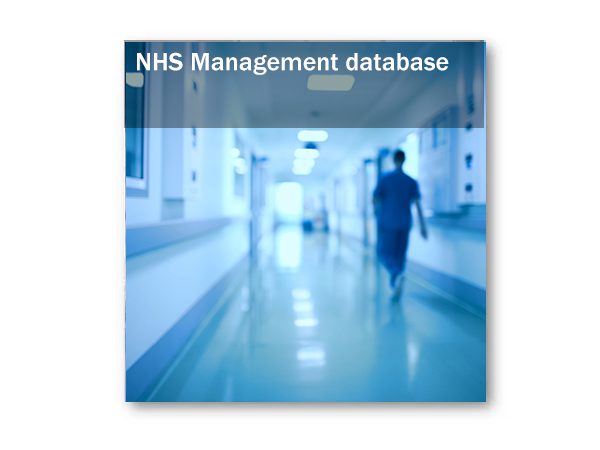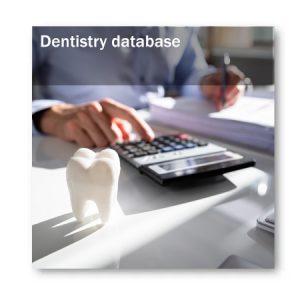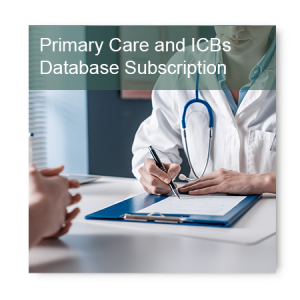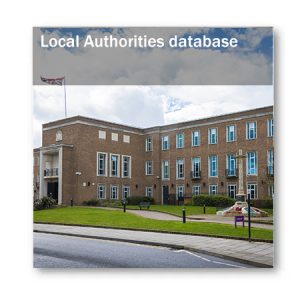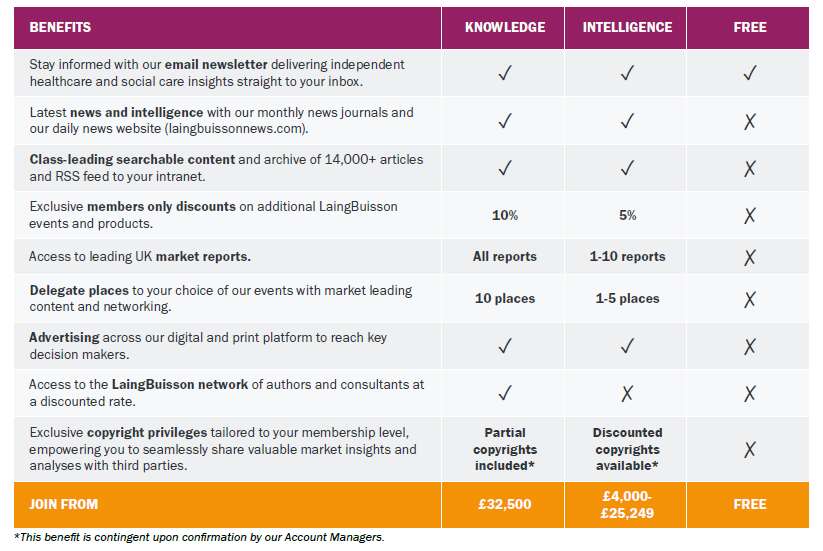NHS Management Database Subscription

Want to know more? Our sales team can help
Call: 020 7841 0045
Email: [email protected]
15,000+ records
Covering all Secondary and National Healthcare organisations, including Acute, Mental Health and Ambulance Trusts and their Hospitals. Post coverage includes Executive and Non Executive Board Membership, Senior Management and Medical and Clinical Leadership.

£3,000.00 (£3,600.00 incl VAT) for 1 year
By clicking on Buy Now you are acknowledging that you have read and understood the Data Licence Agreement and agree to the terms and conditions.
You are purchasing a 12 month subscription to a dataset which is a comma separated spreadsheet (.csv). Data is updated on a weekly basis. Up-to-date downloads are accessible in your Client Dashboard on this site. Numbers below are indicative and subject to change as data is continually monitored and updated.
NHS Management Database
Counts and coverage is shown by the key selection areas of the database. The figures are re-calculated every 24 hours based on the latest research.
NHS Management organisation types breakdown
NHS Management categories and functions breakdown
Most senior ‘non executive’ contact
Reporting directly to the Chairman, second most senior ‘non executive’ contact
The most senior Executive Contact
Most senior Administrative contact. Specific and in some cases statutory post
Senior Director who reports directly to the Chief Officer
Assistant Director or Head of Service that reports to a Director or equivalent
Heads of Service or Managers that report directly to ‘Second Tier’ employees – i.e. are two levels below ‘Top/Director’ Level
People in the NHS responsible for the running and management of the organisation. May include developing policies around and monitoring strategic and financial management
Central management of administrative support services provided for other departments.
Involves advising/planning in connection with strategic issues and developing systematic processes to enable, general organisational development, expenditure programmes and services to be evaluated and optimised.
Responsible for ensuring services are provided efficiently and effectively to the public. This is likely to include points of direct contact with the organisation.
Responsible for the ”publication scheme” and facilitating public access to all types of information held by the organisation
Strategic role concerned with service delivery from a logistical perspective. Often involves co-ordinating partnerships with other organisations.
Management of larger organisations incoming and outgoing mail. May include internal distribution of post to various departments.
Monitoring the services provided by the organisation/department against predefined standards.
Primarily involved with helping adults live at home through advice, guidance and provision of support. Often focused on the physical and mentally handicapped and elderly.
Provide support for adults with all forms of Learning Difficulties
Support people with Mental Health problems. Often Local Authorities work jointly with NHS Trusts and voluntary and charity organisations.
Responsible for helping the elderly through support at home (assessments/home care/home adaptations etc), supporting older people returning from hospital and organising Day Services and Care Homes.
The Director or equivalent of the Department responsible for Adult Social Care – this person has overall responsibility for all areas of service provision.
Responsible for helping people between 18 and 64 with Physical Disabilities to live either at home via home care or provide suitable accommodation – this may be supported living or a Residential/Nursing Home.
Responsible for the strategic development of Adult Social Care service provision
Monitoring the services provided by the department, may involve dealing with complaints
Responsible for all or some areas of Adult Social Care/Services
Provide advice, guidance and support for people with drug and alcohol dependencies
Lay Member of Clinical Commissioning Group Board
Non Executive Director of Clinical Commissioning Group Board
Clinical Lead of Scottish Community Health Partnership
Committee Member of Scottish Community Health Partnership
General Manager of Scottish Community Health Partnership
Nursing Lead of Scottish Community Health Partnership
Organisational Development Lead of Scottish Community Health Partnership
Executive Member of NHS Community Health Service Board
Non Executive Member of NHS Community Health Service Board
Member of the Health and Wellbeing Board
Non Executive Member of Welsh Local Health Board
Executive Member of Welsh Local Health Board
Person who is not employed as part of management and oversees the running of the organisation
Undertake in-house architectural work and manage work outsourced to private practices and consultants.
Provide engineering and building maintenance services in relation to the organisations buildings, heating, ventilation, electrical and plumbing services.
Assessment and support of families to ensure the health and welfare of children and young people
The Director or equivalent of the Department responsible for Childrens Education and Social Care – in most Local Authorities, Education and Childrens Social Care all fall within one Department
Statutory requirement for Local Authorities to assess and provide support for children where they have been identified as having special educational needs (SEN).
Responsible for all/some areas of Children’s Social Care
Develop strategies to reduce alcohol and drug usage/dependency. Including through intervention, education and awareness raising.
Promoting healthier lifestyles to the public, including advise and support on Diet, Exercise, Alcohol and Tobacco control etc
Promoting the image and services provided by the organisation
Planning for and co-ordination of emergency services and related services to deal with disasters and major problems.
Contacts working within the three Emergency Services
Financial audit and fraud investigation of all services.
Overall responsibility for financial services in the organisation
Manages central, departmental and service accounts.
Responsible for ensuring wages are paid on time and in accordance with statutory regulations
Responsible for day-to-day operation of departmental accounts. Usually in accordance with budgets and processes laid down by the central finance department
Management and running of the organisations restaurants; cafes; bars; etc. and contracts with outside caterers.
Responsible for the collection and distribution of blood within the NHS
Responsible for the Inspection and Registration of Privately managed/run Care and Nursing Homes.
Ensure that NHS organisations are maintaining/improving their standard of care – often through audits and reviews of patient experiences.
Responsible for Nursing functions within the NHS, specifically working within a clinical department/ward
Addresses and contact details of Individual NHS Trust run Hospitals.
Responsible for developing and implementing infection protection and control measures within NHS Hospitals/Clinics.
Senior Nursing Contact within the NHS, responsible for ensuring the efficient and effective management of care on Hospital Wards
Responsible for co-ordinating and developing the Medical/Clinical functions provided by organisation
A specialist in pregnancy, childbirth and womens reproductive and sexual health
Responsible for managing and co-ordinating the various nursing functions within both primary and secondary (acute) care. Includes Clinical Governance, which will often be monitored in conjunction with the Medical Services department
Responsible for dealing with complaints and providing support and advise to patients and members of the public
Monitor patient experience and clinical outcomes to identify and reduce risk, includes managing the quality of commissioned/contracted services.
Responsible for part or all of the provision of ‘Primary Care’ services – GP Surgeries/Walk-in Centres/Dentists/Optometry Practices
Responsible for improving the health of the public within Local Government and the NHS. Can include planning, monitoring health trends, encouraging healthy lifestyles and diet, protecting the public from infectious diseases and enforcing food safety.
Promoting the benefits of reducing drug and alcohol consumption and reducing the instances of related illness
Responsible for promoting the benefits of not smoking and providing support to people wishing to stop
Responsible for scheduling the use of Hospitals operating theatres and ensuring all equipment and staff are available when needed.
In charge of in-house IT for the whole organisation and management of contracts with outsourced/contracted IT. Responsible for corporate policies and related purchasing.
Responsible for managing, and in some cases providing, data and other electronic information
Responsible for the development of the organisations website.
Involved with ensuring networks and computer systems are optimised to avoid viruses, theft and other forms of damage
Responsible for implementing online/automated ways of providing public services utilising muti-media technologies
”Geographic Information System” – used for mapping / planning
Manages departmental / organisation wide computer network(s)
Overseeing telecommunications facilities and bought-in services.
Oversee the cleaning and maintenance of hospitals – includes laundry/repairs/maintenance of furnishings etc
Management of the use of energy by the organisation
Overall and day-to-day management of all kinds of property owned by the organisation. Depending on the organisation type can include offices, depots, hospitals, classrooms, public buildings, smallholdings and farms, etc.
Management of the organisations cars, vans, buses and other vehicles. May include maintenance on site, or the management of service providers
Internal implementation of legislative requirements concerned with the safety of employees and members of the public within publicly run/owned buildings
Operational responsibility for managing assets and resources for individual hospitals
Specific element of Domestic Services within the NHS – responsible for cleaning bedding, theatre linen and patients clothing
Responsible for the safety of property, facilities and personnel.
All kinds of in-house and outsourced legal work.
Manage, file, store and retrieve archive material relating to the administrative area covered by the organisation
Responsible for protecting the confidentiality of patient information within the NHS
Management of the organisations Libraries – this includes management of branch and central libraries in the case of Local Authorities
Management, development and research of in-house records and information services and systems.
Treatment of patients arriving in hospital with serious injuries or have developed a sudden illness/condition.
Dealing with the immediate medical requirements of patients who come into hospital as emergency cases. Likely to include cardiology/endocrinology/respiratory medicine/older people services/gastroenterology
Responsible for administering anesthetics (local/general/other nerve blockers) to patients , treatments for pain reduction, monitoring patients whilst under anesthetic and resisitation techniques.
Testing and Assessment of issues and conditions associated with hearing and balance.
Assessment, treatment and surgery of conditions and diseases affecting organs within the chest. Primarily the heart and lungs.
Department Director/Head responsible for one/many clinical functions
Organising and co-ordinating the needs of clinical departments. Often works as a point of contacts between medical and management staff
Services to the community including health visiting, community nursing, rehabilitation and intermediate care.
Hospital based senior Doctor leading a team within one or many medical, clinical, surgical or technical departments
Care associated with patients with life-threatening illness or injury as a result of accidents, infections or surgery.
Responsible for the diagnosis and treatment of all types of Diabetes and Endocrine Disorders, such as Hypo & Hyperthyroidism
Assessment, treatment and surgery connected with the ears, nose and throat (also know as otorhinolaryngology)
Healthcare for older people, may be provided through specialist facilities/clinics. Includes pre and post operative care and support
Support and treatment of young people through psychiatry, counseling and therapy that are suffering with mental health problems that affect home/school life
Covers a variety of areas from patients are expected to be on a ‘General Medicine’ ward for a few days and may involve testing, investigations and minor procedures. Often also includes ‘sub services’ such as Haematology/Respiratory/Elderly/Gastrointestin
Treatment and surgery for conditions connected with colon/rectum/bowel/intestines/vascular system. Often using minimally invasive (Laparoscopic) surgery techniques.
The study of blood and blood diseases
Co-ordinating and running the services provided by clinical department within the hospital. Often report to consultants.
Assessment, support and treatment of patients with mental health and learning disabilities. This is often through dedicated ‘Mental Health Trusts’ which run secure hospitals for treatment and log term care.
Treatment for diseases of the Nervous System – includes neurology, neurosurgery, neuro-oncology, neuro genetics, neuropathology
Assessment, treatment and surgery connected with the female reproductive organs.
Responsible for assessing and providing information, advice and support for people coping with disabilities at home and work, helping them to be more independent
Dealing with the study, diagnosis and treatment of cancer
Treatment of diseases and conditions affecting the visual pathways – eyes and surrounding areas.
Assessment and surgery relating to correcting dental and facial (maxillofacial) disorders, also includes patients that require surgery to remove teeth or need restorative work.
Treatment of conditions connected with the musculoskeletal system, including injuries, infections, trauma, diseases and congenital conditions
Medical care for children and adolescents. Includes treatment of conditions, diseases and neonatology
Concerned with relieving suffering and easing symptoms associated with terminal illness.
Diagnosis of diseases though the analysis of bodily fluids – blood, urine and soft tissues.
Purchasing medicines on behalf of the organisation, checking prescriptions and dispensing. May also involve giving advise to medical staff and patients.
Assessment, treatment and rehabilitation of patients suffering with problems caused by aging, accidents or illness. Treatment through manual therapy and therapeutic exercise.
Examination and assessment of patients mental state/status. Involves cognitive and personality testing and neuroimaging (brain scans). Treatment may involve medical and/or psychotherapy.
Assessment and support for people suffering from emotional problems, anxiety and addiction. Helping patients deal with the effects of traumatic events – accidents/surgery etc
Use of imaging technology to identify and treat disease. Scans vary in type using a variety of technologies including sound/xray and magnetic fields.
Provide support and treatment for people with Physical Disabilities (usually of a working age) in order to help them to get back home/to work.
Diagnosis and treatment of problems affecting the joints, muscles soft and connective tissues.
Immediate treatment and stabilisation of patients with serious and multiple injuries. Including involving Head, Neck, Chest and Bones
Assessment, treatment and surgery connected with the urinary tracts of males and females, plus the male reproductive system. Covers bladder/ureters/urethra/kidneys/prostrate
Clinical Directorate covering a range of acute and community services – often including maternity and child health
Setting up partnerships with other public and private organisations and generally seeking “joined-up” approaches to the provision of public services.
Human resource and personnel management for the organisation as a whole. Day-to-day management may be delegated to departments in larger organisations
Dealing with day-to-day staff matters for a specific department within the organisation. The extent of this role depends on the amount of autonomy given to departments.
Ensuring that in-house management and external services meet legislative requirements and developing policies and programmes to advance all kinds of equality in the administrative area.
Person with responsibility/influence for the buying/purchasing of goods and services connected with Building/Engineering
Person with responsibility/influence for the buying/purchasing of goods and services connected with Capital Equipment
Central management of major contracts that the organisation has with service providers
Management of some or all of an organisations purchasing processes; including lists of approved suppliers; bulk purchases; organisation wide standards and annual contracts.
Assessment of need and delivering solutions though the procurement of products and services within Health and Social Care. Often includes managing and co-ordinating contractors and service providers.
Management of some or all purchasing for a specific department/function within the organisation
Person with responsibility/influence for the buying/purchasing of goods and services connected with Diagnostic/Medical Equipment
Person with responsibility/influence for the buying/purchasing of goods and services connected with Domestic Cleaning/Laundry
Person with responsibility/influence for the buying/purchasing of goods and services connected with Food/Catering
Person with responsibility/influence for the buying/purchasing of goods and services connected with Medical/Surgical
Person with responsibility/influence for the buying/purchasing of goods and services connected with Performance/Planning
Person with responsibility/influence for the buying/purchasing of Pharmaceutical goods and services
Managing relationships within individual organisations when purchasing in bulk/through a central purchasing consortia
Person with responsibility/influence for the buying/purchasing of goods and services connected with Transport
Management of training budget; organising specific training events and liaising with training consultants/providers.
NHS Management seniority breakdown
NHS Management regional breakdown

